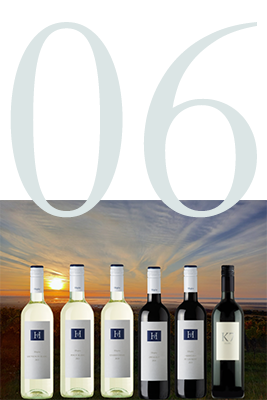Home / Glossary Terms / Page 2
A colloquial term for the non-European grapevine varieties, that originate from North, Central and South America, and do not belong to the European Vitis vinifera grape family. Common examples in Austria are Isabella, Delaware and Otello.
Physical or chemical analysis to determine the composition of the wine composition. Every Austrian Qualitätswein (quality wine) available for sale must be inspected and have the chemical analysis examined.
The collective term for drinks, usually alcoholic, that are served as an appetiser before a meal.
A tasting description referring to the aromas smelt through the nose.
The positive description of the aroma components that derive from the grape. The various types of aromas, ranging from floral, fruity, spicy and so on, are listed in the aroma wheel. Both the bouquet in the nose and the retronasal aroma perception at the back of the throat, often described in English as the flavour.
We sub-divide the aromas into three categories, the primary, secondary and tertiary aromas or bouquet. Primary aromas refer to the fruit flavour components found in the grape, and which upon tasting, are recognisable with aromas present in the finished wine.
We speak of wine-like or grapey aromas, and often you can recognise the character of the grape variety from a particular scent of berries, fruit, petals or flower, for example the intense rose petal aroma in Traminer.
The secondary aromas come from the winery, and are aromatic components that derive from grape handling, fermentation and the maturation of the wine. You can even refer to the smell of fermentation, or detect wine faults (such as too much sulphur dioxide) yet the more desirable aromas include roasting or toasting and vanilla from oak barrel aging.
The tertiary aromas are those that develop with bottle aging, a typical example being the development of the petrol note with maturing Riesling. Again, wine faults may also be included, the most common being cork taint.
The aroma wheel is a comprehensive list of all aromas and flavours found in wine, such as fruity, floral, plant-like or herbaceous (vegetive), spicy notes, with a hint of caramel, smoky or burnt aromas, soil notes and microbiological aromas.
Wine with a fine and delicate floral aroma are described as being aromatic.
Describing a wine with a pronounced bouquet and intensive taste (e.g. Traminer, Gelber Muskateller).
A wine with astringent tannins, or that is tannic, leaving a drying, often bitter taste, usually found in red wine.
Usually official wine awards conducted in wine competitions. A significant wine award competition in Austria is the SALON Österreich Wein, and these wines are primarily selected by the regional wine tasting committees.
The Austrian Wine Challenge (AWC) is one of the world’s most successful wine competitions, with over 10,000 entries. The prize-giving ceremony takes place annually in Vienna’s City Hall (Rathaus).
Höpler GmbH, Heideweg 1
7091 Breitenbrunn, Austria
+43 (0)2683 23907
office@hoepler.at
Höplers Weinräume, Hauptstraße 52,
7092 Winden am See, Austria
+43 (0)2683 23907-30
info@weinraeume.at
ÖFFNUNGSZEITEN BÜRO | |
|---|---|
Mon to Thurs | 7:30am – 4:30pm |
Friday | 7:30am – 12pm |
Sat/Sun | Closed |
Frohes neues Jahr 2024
Betriebsurlaub
Wir sind ab dem 8. Januar wieder für Euch da!

Lorem ipsum dolor sit amet, consectetur adipiscing elit. Ut elit tellus, luctus nec ullamcorper mattis, pulvinar dapibus leo.